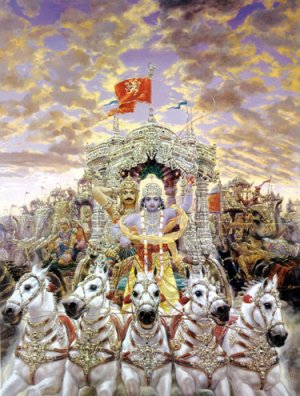The Bhagavad Gita, also referred to as Gita, is a 700-verse Dharmic
scripture that is part of the Hindu epic Mahabharata. This
scripture contains a conversation between Pandava prince Arjuna and
his guide Krishna on a variety of philosophical issues.
Faced with a fratricidal war, a despondent Arjuna tus to his charioteer Krishna for counsel on the battlefield. Krishna, through the course of the Gita, imparts to Arjuna wisdom, the path to devotion, and the doctrine of selfless action. The Gita upholds the essence and the philosophical tradition of the Upanishads. However, unlike the rigorous monism of the Upanishads, the Bhagavad Gita also integrates dualism and theism.
Numerous commentaries have been written on the Bhagavad Gita with widely differing views on the essentials, beginning with Adi Sankara's commentary on the Gita in the eighth century CE. Commentators see the setting of the Gita in a battlefield as an allegory for the ethical and moral struggles of the human life. The Bhagavad Gita's call for selfless action inspired many leaders of the Indian independence movement including Mohandas Karamchand Gandhi, who referred to the Gita as his "spiritual dictionary". Бхагавад-гита (санскр. भगवद गीता, Bhagavad Gītā IAST «Божественная песнь») — памятник древнеиндийской литературы на санскрите, часть «Махабхараты», состоит из 700 стихов. «Бхагавад-гита» является одним из священных текстов индуизма, в котором представлена основная суть индуистской философии. Считается, что «Бхагавад-гита» может служить практическим руководством как в духовной, так и в материальной сферах жизни. Часто «Бхагавад-гиту» характеризуют как один из самых уважаемых и ценимых духовных и философских текстов не только традиции индуизма, но и религиозно-философской традиции всего мира.
Faced with a fratricidal war, a despondent Arjuna tus to his charioteer Krishna for counsel on the battlefield. Krishna, through the course of the Gita, imparts to Arjuna wisdom, the path to devotion, and the doctrine of selfless action. The Gita upholds the essence and the philosophical tradition of the Upanishads. However, unlike the rigorous monism of the Upanishads, the Bhagavad Gita also integrates dualism and theism.
Numerous commentaries have been written on the Bhagavad Gita with widely differing views on the essentials, beginning with Adi Sankara's commentary on the Gita in the eighth century CE. Commentators see the setting of the Gita in a battlefield as an allegory for the ethical and moral struggles of the human life. The Bhagavad Gita's call for selfless action inspired many leaders of the Indian independence movement including Mohandas Karamchand Gandhi, who referred to the Gita as his "spiritual dictionary". Бхагавад-гита (санскр. भगवद गीता, Bhagavad Gītā IAST «Божественная песнь») — памятник древнеиндийской литературы на санскрите, часть «Махабхараты», состоит из 700 стихов. «Бхагавад-гита» является одним из священных текстов индуизма, в котором представлена основная суть индуистской философии. Считается, что «Бхагавад-гита» может служить практическим руководством как в духовной, так и в материальной сферах жизни. Часто «Бхагавад-гиту» характеризуют как один из самых уважаемых и ценимых духовных и философских текстов не только традиции индуизма, но и религиозно-философской традиции всего мира.

